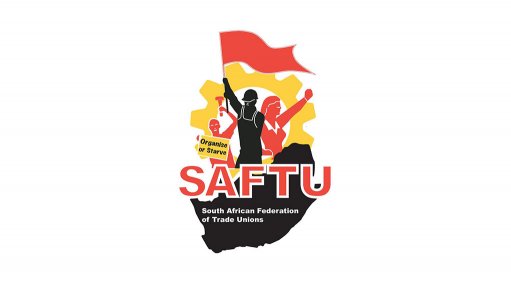
The South African Federation of Trade Unions sees no reason to celebrate the news that, according to StatsSA’s report of 2.2% GDP growth for the third quarter of 2018, the economy is longer in recession.
For the 37.3% of South Africans without a job, the six million children living below the food poverty line, and all the other millions living in poverty and hunger, this minimal increase in production will do nothing to end their recession.
It will not improve the dire quality of life of the poor majority or their prospects for the future.
For the majority there will be no happy festive season this year or for years to come unless there is a fundamental change in policy. The working class movement has declared this a black festive season and called on the working class to share whatever they have with their more unfortunate neighbours and family members.
These figures will just mean more ‘jobless growth’, just as in the years between 1993 and 2017 when the economy grew an average of 2.78% a year yet the official unemployment rate (using the narrow definition that doesn’t count discouraged work seekers) increased from about 20% in 1994 to over 27% in 2018.
Unemployment will rise even higher, as all the planned retrenchments in the mines, the SABC, Standard Bank, Eskom and possibly SAA, come into effect.
The only ones to benefit from this news from StatsSA are the capitalists and wealthy shareholders who will be drinking champagne to celebrate the rise in their share prices on the JSE.
This will widen still further the country’s inequality which is already much higher than it was in 1994 and has become the highest the world.
As the rich get richer the poor face further cuts in living standards, with the danger of more hikes in electricity tariffs to make the poor pay for the looting and mismanagement of this vital public service, on top of the rises in VAT, petrol prices and ‘sin taxes’, which we have suffered this year.
The 2.2% growth rate will not even make up for the declines of 2.6% in the first quarter of 2018 and 0.4% in the second. The figure for the fourth quarter is still to come but the SA Reserve Bank has already projected just a pitiful 0.6% real economic growth for the full year, while the enforcers of the neoliberal paradigm - the ratings agency S&P Global - expects an increase of 0.8%.
And the growth is not across the board. Mining production dropped by 8.8% and the electricity and construction sectors by 0.9% and 2.7% respectively. These are all key areas, which need to be growing, not declining, if the rest of industry is to have any prospect of sustaining this quarter’s growth.
SAFTU certainly does not see these statistics as any kind of proof that President Ramaphosa’s ‘new dawn’ has arrived. His, and the ANC’s, ‘business as usual’ policies, dictated by the needs of international financial institutions, their credit ratings agencies and South Africa’s monopoly capitalists, has shifted the balance of wealth and power further in favour of the rich and powerful.
This can be seen in the much more aggressive approach of employers like Dis-Chem, who are not even prepared to negotiate with NUPSAW and its members for improvements in their wages and working conditions.
SAFTU reiterates that South Africa remains trapped in a low growth path that regenerates unemployment, poverty and inequality. Unless we can change the growth path and address all the structural deficiencies we inherited from apartheid, colonialism and capitalism we shall remain the country of so much wealth and opulence for the few whilst the majority are trapped in grinding poverty, joblessness and degrading inequalities.
Accordingly we reiterate our call for the full implementation of the economic demands of the Freedom Charter which have been abandoned by the ANC government at the altar of capital pressure and real state capture.
We call for the redistribution of wealth and land through nationalisation of the mining, finance and manufacturing monopolies and democratic planning of the economy involving workers and the community.
The resources of the country which includes its mineral wealth must be used for the benefit of all citizens, not the international investors and a handful of shareholders.
They must be beneficiated and they must help us build secondary industries as part of an aggressive drive to reindustrialise, and to put an end to the current deindustrialisation that has seen the manufacturing contribution to the GDP plummet from over 20% in 1994 to around 11% - 12% today.
To this end SAFTU has embarked on a two-pronged campaign to take forward the campaigns we committed ourselves to at the recent special Central Committee and the Working-Class Summit:
- The Living Wage – for a living wage for all workers and against the poverty national minimum wage, VAT and petrol price increases, banning labour brokers, and labour law amendments which effectively ban strikes and pickets
- The Social Wage - on land, housing, education, health, transport, crime and corruption, and link them to the call for action against government austerity policies and illicit capital outflows, and for wealth taxes on the rich.
SAFTU will mobilise a campaign of mass action, together with the Working Class formations, in pursuit of our socio-economic demands, which will take us to every town, village, farm and workplace across the length and breadth of our country, centred around a three-day national strike early in 2019.
We will hold a press conference in the coming week to outline the programme for our members and the rest of the working class formations to protest against this deepening socio-economic crisis.
Issued by SAFTU